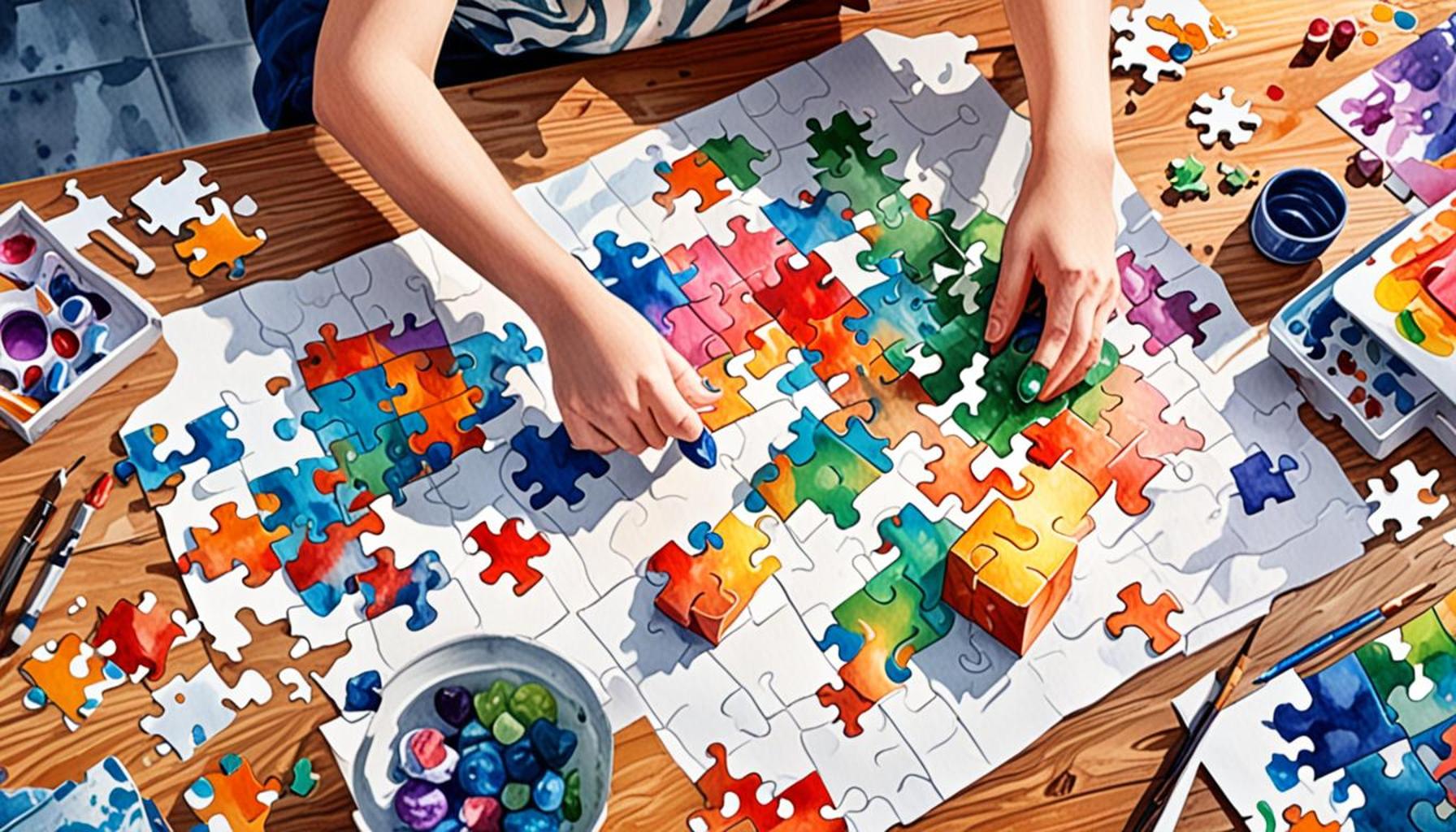How the Practice of Mental Games Can Improve Resilience in Stressful Situations

The Essential Role of Mental Games in Building Resilience
In our fast-paced society, stress is a common experience, often leading to anxiety and burnout. Consequently, developing resilience—the capacity to recover quickly from difficulties—is paramount for maintaining our emotional stability and overall health. One innovative avenue to bolster this resilience is through the use of mental games.
Mental games extend far beyond mere entertainment; they are robust tools for cognitive enhancement and personal development. Engaging regularly in these kinds of activities can yield numerous benefits, including:
- Boosting problem-solving skills: Games like chess or Sudoku challenge players to think critically and find solutions under time constraints.
- Improving focus and concentration: Games that require attention to detail, such as memory matching games, sharpen one’s ability to concentrate specific tasks.
- Developing emotional intelligence: Multiplayer games that incorporate social dynamics help players navigate emotions and reactions better, both theirs and others’.
- Enhancing decision-making abilities: Strategy-based games encourage quick thinking and assessments based on limited information, honing decision-making prowess.
Numerous studies underline the efficacy of mental games, particularly within high-pressure environments like corporate settings or during life crises. These games provide a much-needed mental buffer, allowing individuals to:
- Step back and assess the situation calmly: Engaging in a brief mental game can create a pause that helps in regaining composure.
- Reduce anxiety and stress levels: Immersing oneself in a game can shift focus away from stressors, promoting relaxation.
- Enhance their capacity to respond effectively: By simulating high-pressure scenarios in a gaming context, players can practice their responses in a low-stakes environment.
The necessity for mental agility is increasingly evident, given the myriad of challenges life presents. Therefore, understanding how to effectively utilize mental games to bolster resilience has never been more vital. With a plethora of options available—from brain-teasing puzzles and interactive video games to traditional card games—the key lies in discovering how to tailor these experiences to fit one’s unique situations and personal preferences.
For instance, individuals seeking to foster teamwork and communication might benefit from cooperative games, while those looking for a solitary challenge might prefer intricate puzzles that stimulate their problem-solving abilities. The path to resilience can be as diverse as the individuals embarking upon it, emphasizing the importance of personalized strategies in mental game selection.

As we continue to navigate an increasingly complex world, the exploration of mental games offers an intriguing opportunity to enhance not only cognitive skills but also our emotional resilience—acts of empowerment that can foster not only individual growth but communal support as well. So, which mental games will you explore to unlock your resilience? The possibilities are endless.
DISCOVER MORE: Click here to learn how games can relieve stress
Unlocking Cognitive Potential through Mental Games
The psychological benefits of engaging in mental games are gaining recognition among experts as a vital strategy for developing resilience in the face of stress. These games not only serve as enjoyable pastimes but also play a significant role in nurturing cognitive skills and emotional fortitude. Understanding how these mental exercises work can empower individuals to adopt healthier coping mechanisms.
Central to the effectiveness of mental games is their ability to foster critical thinking and adaptability. In a stressful situation, the brain can easily become overwhelmed, leading to emotional paralysis or unfavorable decision-making. Mental games engage various cognitive functions, providing a safe arena for individuals to practice reacting under pressure. For example, playing a game of chess demands foresight and strategy, encouraging players to anticipate opponents’ moves while also evaluating possible outcomes of their decisions. This dynamic can translate to real-life situations, allowing individuals to approach stressors with a more analytic mindset.
Furthermore, the immersive nature of these games can serve as a powerful distraction, helping to alleviate feelings of anxiety. This reduction in stress levels is particularly pivotal, as chronic stress can undermine resilience over time. Engaging in games such as crossword puzzles or challenging trivia can be a form of mental escapism, permitting the mind to shift focus momentarily. By allowing individuals to concentrate on solving complex problems within a game, they are often better equipped to handle their everyday challenges with a clarified mind.
Benefits of Mental Games in Developing Resilience
Embracing mental games offers a range of psychological benefits that can enhance resilience during stressful times. Here are some key advantages:
- Enhanced focus: Games that require concentration, like memory matching games, help train the brain to stay on task, improving one’s ability to maintain composure amid distractions.
- Improved adaptability: Strategy games, such as Risk or Settlers of Catan, cultivate flexibility in thinking, allowing players to pivot strategies based on changing circumstances, much like navigating life’s unpredictable nature.
- Increased confidence: Successfully completing mental challenges fosters a sense of accomplishment and self-efficacy, which boosts morale and confidence when faced with adversity.
- Social support: Multiplayer games often require teamwork and communication, helping individuals cultivate relationships and develop emotional connections crucial for resilience.
By exploring the realm of mental games, individuals can not only find enjoyment but also discover a transformative pathway to enhanced resilience. As research continues to support these cognitive benefits, the incorporation of mental games into daily routines becomes a practical endeavor for those seeking to strengthen their emotional defenses against stress.
Enhancing Focus and Concentration
Engaging in mental games is a powerful strategy for improving focus and concentration, which are essential components of resilience in stressful situations. Activities such as puzzles, strategic board games, and memory exercises force individuals to direct their cognitive resources toward specific tasks. This focused thinking not only sharpens mental agility but also prepares the mind to tackle real-life challenges with greater acumen. Studies indicate that individuals who regularly participate in such activities report higher levels of mental clarity and awareness, enabling them to remain calm and composed in times of stress.
Building Adaptive Thinking Skills
Mental games also foster adaptive thinking, a crucial element of resilience. When playing strategy-based games, individuals are prompted to analyze multiple scenarios and make decisions under pressure. This practice helps develop cognitive flexibility, allowing one to pivot and adjust strategies in response to shifting circumstances. For instance, engaging with games that require quick decision-making can cultivate a mindset that embraces change rather than fearing it. As a result, individuals are better equipped to handle unexpected stressors, transforming potentially overwhelming situations into manageable challenges.
Social Interaction and Support
Participating in mental games often becomes a communal activity, fostering social interaction and support, both of which are vital for resilience. Collaborative games enhance teamwork and communication skills as players share strategies and encourage one another. Additionally, the social bonds formed during these activities can provide emotional support during challenging times, creating a network of encouragement that strengthens overall psychological well-being. This sense of community offers a buffer against stress, helping individuals to not only cope but thrive amidst adversity.
Boosting Self-Efficacy
Regularly engaging in mental games can significantly boost self-efficacy, reinforcing the belief in one’s abilities to overcome obstacles. As players navigate through various levels of difficulty, they experience a sense of accomplishment which, in turn, can enhance their confidence in dealing with real-life stressors. This increased self-assurance allows individuals to approach challenges with a proactive mindset, believing they have the skills to influence outcomes positively. Over time, this empowerment contributes to a resilient mindset that supports enduring success in both personal and professional endeavors.
Integrating Mindfulness Practices
Incorporating mindfulness strategies into mental games can further deepen resilience. Mindfulness encourages players to remain present during gameplay, honing their ability to manage anxiety and stress effectively. Techniques such as deep breathing or purposeful pauses while playing can reinforce a sense of calm amidst high-pressure moments, translating to improved stress management skills. When individuals learn to master their mental and emotional states in gameplay, they are better prepared to face and thrive in the complexities of life.
The Road Ahead
Embracing the practice of mental games opens a myriad of avenues for improving resilience in stressful situations. By refining focus, enhancing adaptive thinking, promoting social connections, boosting self-efficacy, and integrating mindfulness, individuals can cultivate a robust mental framework. This proactive approach not only prepares one for adversities but transforms challenges into opportunities for growth and development. The journey toward resilience is ongoing, and the tools gained through mental games are invaluable in navigating the intricacies of life’s continuous challenges.
DISCOVER MORE: Click here to enhance your strategic thinking
Building a Stronger Mindset through Continued Engagement
Developing resilience is akin to building muscle; it requires consistent effort and practice. Mental games provide a structured yet enjoyable way to train the mind, setting the stage for a more robust response to stressors. One of the remarkable features of these games is their versatility, allowing individuals of all ages to engage in a variety of formats that suit their preferences and cognitive levels. From simple card games to intricate strategy games, the spectrum of options ensures that there is something for everyone.
Consider games like Sudoku or logic puzzles, which sharpen problem-solving skills and can significantly enhance cognitive flexibility. Studies have shown that engaging in these types of games routinely can lead to improved mental agility, which is essential when facing challenges in high-pressure situations. The brain’s neuroplasticity, the ability to reorganize itself by forming new neural connections, is stimulated through consistent play, effectively rewiring how we respond to stress.
The Science Behind Mental Engagement
Research has provided compelling evidence of the relationship between mental games and resilience-building. According to a study published in the Journal of Experimental Psychology, individuals who regularly engaged in strategic mental exercises reported lower levels of stress and greater emotional stability. This finding highlights the idea that mental engagement can serve as a form of cognitive therapy, promoting resilience by reinforcing neural pathways associated with positive emotional responses.
Moreover, engaging in mental games fosters a growth mindset—a concept popularized by psychologist Carol Dweck. Players are encouraged to view challenges as opportunities for growth rather than insurmountable obstacles. This shift in perspective is crucial when navigating life’s inherent unpredictability. For instance, a player who loses a match learns to reassess strategies and improve, an essential skill when faced with real-life setbacks.
Social Dynamics and Resilience Enhancement
The social aspects of multiplayer mental games cannot be overstated. Engaging with others in a competitive or cooperative environment cultivates important life skills such as communication, teamwork, and emotional intelligence. Games like team-based escape rooms or even virtual environments in popular online games such as Fortnite encourage participants to work together toward a common goal while managing stress and uncertainty. These experiences help individuals develop a support network, demonstrating that resilience is not simply an individual endeavor but often flourishes in community settings.
Furthermore, forming bonds with others through gaming can alleviate feelings of isolation, a common byproduct of stress. Regular interaction with peers during gameplay can lead to nurturing social relationships, improving overall mental health and well-being. A sense of belonging is vital when confronting life’s challenges, and engaging in mental games nurtures this support system.
As the understanding of mental games continues to evolve, it becomes increasingly clear that they are not just recreational activities but powerful tools for resilience enhancement. From cognitive exercises that strengthen our ability to think on our feet to social engagements that foster lasting relationships, mental games pave the way for individuals to build capacity in managing stress effectively. The key lies in the willingness to engage regularly and the determination to push through challenges, cultivating a resilient mindset ready to tackle whatever life throws their way.
DISCOVER MORE: Click here to find calm through puzzles
Conclusion: Empowering Resilience Through Mind Games
The practice of mental games serves as a transformative avenue for developing resilience, providing individuals with practical tools to navigate life’s inevitable stressors. Through consistent engagement in these activities, we not only sharpen our cognitive skills but also foster a growth mindset that embraces challenges as opportunities for learning. The scientific backing for these practices underscores their effectiveness; studies illustrate that regular involvement in mental exercises significantly correlates with reduced stress levels and heightened emotional stability.
Moreover, the social dynamics of multiplayer games introduce an enriching layer to resilience-building. The collaborative nature of games like team-based escape rooms creates not only a space for strategic thinking but also cultivates essential life skills such as communication and emotional intelligence. Forming connections through these shared experiences mitigates feelings of isolation and enhances one’s support network, essential components for overcoming adversity.
Ultimately, mental games are more than mere pastimes; they act as crucial instruments in the continual effort to fortify our mental resilience. By integrating these practices into our daily lives, we can empower ourselves to better manage stress and foster a more adaptable mindset. Embrace the challenge of mental engagement as an investment in your capability to thrive in the face of pressure. As we further explore the intersection between gaming and mental resilience, it becomes evident that the mind’s potential is not only vast but, with the right tools, also remarkably robust.


